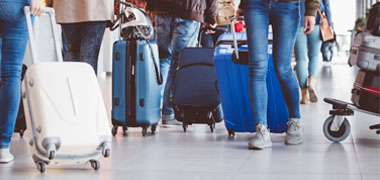
This role has a low level of AI exposure. Core skills such as adaptability, social intelligence, and complex physical tasks remain beyond the capabilities of current AI.
Explore all careersA Flight Attendant ensures passenger comfort and safety during flights by checking tickets, demonstrating procedures, and serving refreshments.
Get qualified to work as a Flight Attendant with a course recognised across Australia. Speak to a training provider to learn more.
Browse occupations related to Flight Attendant
In Australia, a full time Flight Attendant generally earns $1,200 per week ($62,400 annual salary) before tax. This is a median figure for full-time employees and should be considered a guide only. As you gain more experience you can expect a potentially higher salary than people who are new to the industry.
 Courses.com.au Team
Courses.com.au Team
This industry has experienced stable employment numbers over the last five years. There are currently 8,500 people employed as a Flight Attendant in Australia, compared to 8,300 five years ago. Flight Attendants may find work across all regions of Australia.
Source: Australian Government Labour Market Insights
 Courses.com.au Team
Courses.com.au Team
A Certificate III in Aviation (Cabin Crew) is an ideal qualification if you’re planning a career as a Flight Attendant. This course covers topics including aircraft safety, customer service and situational awareness. You’ll develop the skills to recognise and respond to mid-flight emergencies or security threats, operate firefighting equipment, prepare food and beverages and process financial transactions.
 Courses.com.au Team
Courses.com.au Team



A Flight Attendant takes on a range of duties during an aircraft flight. You’ll work as part of a cabin crew to attend to the needs of passengers during domestic or international flights. Flight Attendants might check passenger tickets and show people to their correct seats. You might conduct safety inspections, demonstrate emergency procedures and serve food and drinks.
Flight Attendants should have excellent interpersonal skills and demonstrate strong customer service. You’ll need to be a good communicator and be able to interact with passengers from a range of backgrounds. It’s important that you can remain calm in stressful situations and draw on your problem solving abilities when needed.